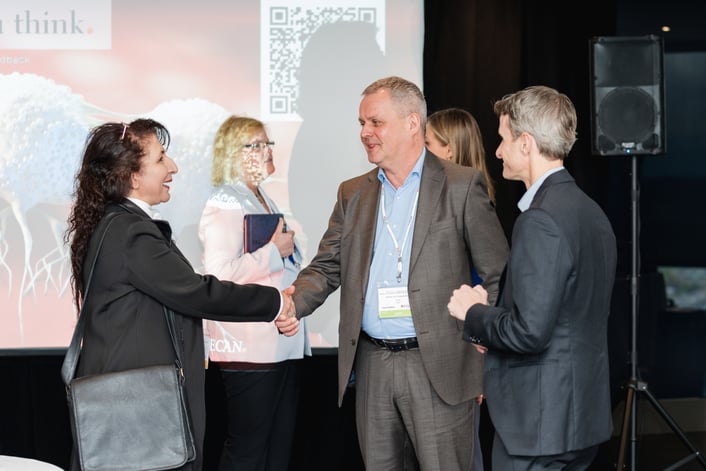Tecan uses cookies to improve our website. By continuing to browse our website, you accept our cookie policy.
Tecan uses cookies to improve our website. By continuing to browse our website, you accept our cookie policy.

Tecan recently teamed up with Nature Medicine to host a symposium on the latest ground-breaking research into cancer diagnosis and treatment, from novel biomarkers to personalized vaccines and cell-based therapies. A select group of industry leaders and key experts in oncology came together for a two-day event in Boston, Massachusetts, to accelerate research and clinical discoveries through better partnering between industry and academia. This summit highlighted Tecan’s dedication to assembling leaders in cancer – along with technologists, vendors and solutions providers – so they can share knowledge and expertise, and work collaboratively to battle cancer.
The event was opened by Achim von Leoprechting, Chief Executive Officer at Tecan, who asserted the company’s ambitions to accelerate cancer discoveries in partnership with those in the room. “This symposium is more than an event,” Achim commented. “It’s a demonstration of our joint commitment to driving innovation in oncology, with the ultimate goal of improving patient outcomes and alleviating the pressures on healthcare systems around the world.”

Much of the discussion focused on the need to detect cancer earlier to improve the likelihood of treatment success. Grail, a healthcare company based in California, provided an industry perspective on the subject.
The company is developing a liquid biopsy approach to multi-cancer early screening and diagnosis, which searches the blood for fragments of cell-free DNA released by tumors, detecting more than 50 malignancies in a single test. Jeffrey Venstrom, Chief Medical Officer at Grail, explained that the industry is ready to listen, learn and prioritize areas where joint efforts could improve solutions for laboratories or clinical practices, moving us closer to the dream of standardized multi-cancer blood screening. He also highlighted the challenges associated with transitioning from research to commercialization, emphasizing the importance of automation to ensure consistent and efficient results as a company scales.
One of the challenges for both academia and industry is to ‘democratize’ cancer research efforts, by gathering data from more diverse ethnic backgrounds. Sasha Gusev, a statistical geneticist at the Dana- Farber Cancer Institute (DFCI) in Boston, discussed how his work has found that differences in genetic ancestry can bias the results of common assays used to guide life- saving immune cancer therapies. Addressing this variable in existing biomarkers would bring more effective treatments to a broader population, as well as help to identify those patients that could gain the most from immunotherapy at an earlier stage. This field will likely play a more central role in the future fight against cancer, which already includes standard treatments for some malignancies. Darrell Irvine, from the Koch Institute for Integrative Cancer Research at MIT, covered this topic in detail, highlighting the need to expand on existing immunotherapies that treat cancers of the blood, bone marrow and lymphatic system. His research into nanoparticles and synthetic materials is striving to do exactly this, and will hopefully help myriad patients currently not benefitting from some immunotherapies – such as checkpoint inhibitors – by harnessing the power of the immune system to fend off cancer.
Catherine Wu, who leads the division of Stem Cell Transplantation and Cellular Therapies at DFCI, talked about the exciting advances in personalized cancer vaccines. Catherine’s team analyzes neoantigens – tumor-specific proteins – to generate vaccines that can train the immune system to attack cancerous cells, leaving healthy tissues unharmed. This fascinating approach is now ready to scale up, which comes with a variety of challenges – including choosing suitable target proteins, optimizing vaccine delivery methods and extending the concept to a broader range of cancers – but is receiving growing interest from investors and pharmaceutical companies, helping to fund further research.

Alanna Church, a molecular pathologist at Boston Children’s Hospital, expanded on the need for a more personalized approach to cancer care, particularly in pediatric patients. There is still a lack of unique pediatric cancer treatments, which is a significant obstacle for oncologists and can sometimes translate to serious consequences for patients. Alanna’s research focuses on the clinical implications of molecular tumor profiling, which can help clinicians to choose the best therapeutic pathway for young patients. She highlighted the use of the latest technologies – such as next generation sequencing – to accurately characterize known tumors or identify cancer in patients before symptoms appear.
Every tumor is a ‘malignant snowflake’ with its own molecular profile and biological characteristics according to Vivek Subbiah, an oncologist and former medical director of the Clinical Center for Targeted Therapy at MD Anderson Cancer Center, who now works as the Chief of Early-Phase Drug Development at the Sarah Cannon Research Institute in Nashville, Tennessee. He illustrated that even rare cancer types can now be treated with the aid of tumor genome sequencing and targeted drugs, using RET gene mutations and fusions as examples.
These industry leaders, clinicians, academics and researchers are shaping the future of oncology. However, their brilliance alone cannot drive the discoveries to dramatically improve patient outcomes, and collaboration is the essential element to progress cancer screening, diagnostics and treatments. Tecan will once again host industry experts, pioneering researchers and leading oncologists in 2024, to create strong partnerships that push the boundaries of research and accelerate innovation in oncology.